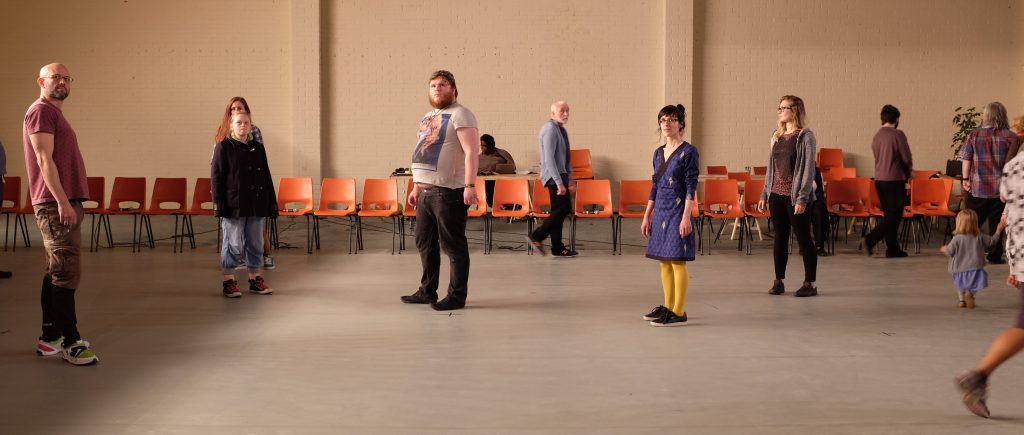On the first day of the first week of rehearsals, we watch the film of the first version of Summer. from June 2014, which was made with and about its 37 performers (you can watch the trailer here.) Summer. was the first element of the quartet to come into existence, so the creative team return to it as a starting point to explore how it might be developed and to identify the ways that echoes of this work (in both content and form) might exist in Autumn., Winter., and Spring. We spend time piecing together the original performance score: a series of instructions, questions for live interviews, and written texts, that come together to create a choreography to be performed by a large group of people. This performance score will be taken apart, played with, developed, and reassembled in the run up to the presentation of Summer. as part of the quartet this March/April.
Quarantine’s work starts with the people in the room, and at the Summer. rehearsals there are lots of them, with almost 40 performers involved so far and the possibility of more still to come. With so many people present, the first few rehearsals feel celebratory, a bit like a family party (but for a room full of relative strangers), with homemade food dished up by the wonderful Kam from the Samosa Shack. There is an energy and warmth in the space; a palpable sense of anticipation that something is beginning. Around the table are questions on scraps of paper, one at each place, to form the basis for conversations: What’s the best gift you’ve ever received? What’s the strangest food you’ve eaten? Do you have anything in your family that has been passed down through the generations? How tall are you? What are you reading just now? Where do you think of as home? Which part of your body do you like the most? When was the last time you cried?
In rehearsals, the creative play with the range of textures and possibilities that having such a large group of performers enables, sometimes working with them as a crowd of people and sometimes focusing in on small groups or individuals. Summer. is about the present moment in time, with instructions and questions responded to live on stage, and content drawn from the very day on which the work is being performed, meaning it’s different at every rehearsal and will be different at every show. There is an on-going conversation about how the form of the work might be tested and refined but without becoming fixed or overly rehearsed. It is important that the performers feel comfortable in the structure of the piece, but that the content remains open and responsive to the shifting circumstances of daily life. This is a difficult balance to achieve and keeps rehearsals interesting. The creative team experiment with elements of the developing performance score, trying to get a sense of what they might look like and how they might work as part of the overall piece, but also attempting to ensure that no performer responds to the same instruction or question too many times.
Summer. is people watching heaven. I am a notorious people watcher at the best of times, a habit inherited from my mum, but this work offers rare permission to openly look, to really look, at other people. The performers are intergenerational, the youngest only six months old and the oldest in their eighties, so even asking them to stand together in a line creates a fascinating snapshot of people at different stages in their lives. Interestingly, this permission to look is not intended to be a one-way privilege, and the performers frequently practice responding to instructions that are about looking back at the audience. I find in these rehearsals that I write very little in my notebook, too absorbed in this simple act of watching and being watched in return.
– Sarah Hunter
